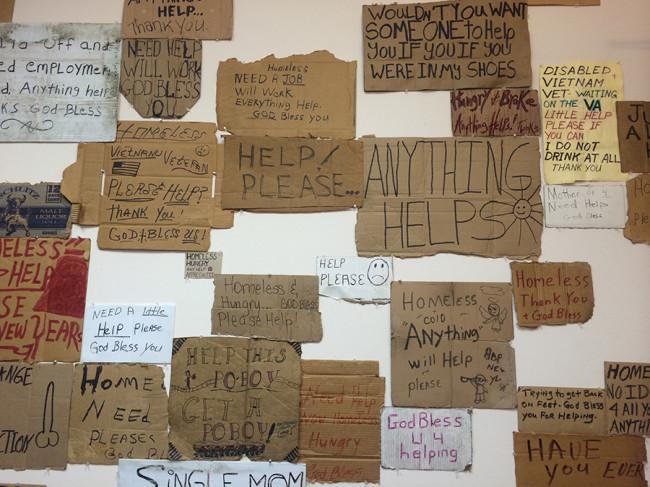
Everyone knows the drill. Pull up to a stoplight along the service road. Spot a homeless man or woman on the corner clutching a sign. Quickly avert eyes and tap leg until the light changes.
Zoom off.
SMU professor Willie Baronet takes a different approach. For the past 21 years, he has been stopping at corners to offer the homeless money in return for their homemade signs.
Baronet is the visiting executive-in-residence as part of the full-time faculty in the creative advertising subset of the SMU Temerlin Advertising Department. He has worked at SMU for three years, but his passion is his art.
Baronet uses the signs in various art projects. He has been featured in galleries and shows across the country. He has hundreds of signs from across the world. If students or friends buy a sign for him, he reimburses whatever they spent. He estimates spending around $6,000 on the hobby.
“This for some reason feeds me in a weird way,” he said.
Baronet said he’s only ever bought two signs while on foot. Typically he drives past a homeless person and asks to buy their sign. Usually, they agree and name a price. As long as it is under $40, Baronet makes the exchange.
One man, who Baronet describes as extremely polite, refused any sum of money for his sign. A woman once sold him a sign and then burst into tears, explaining that the sign belonged to her late husband and had his signature on the back. The idea of his sign being featured in a work of art was what made her willing to part with it.
As a professor, Baronet’s passion for creativity and thinking outside the box are contagious.
“Willie refuses to accept that a student is not creative,” said Mallory Massa, a student of Baronet’s.
According to student Ashley Almquist, his classes are upbeat and there is always a smile on his face. She said Baronet inspires creativity in every student.
“He really encourages us to try new things and expand our horizons, not just in class but in life,” student Madison Herring said. “Because of him, I became a much more open-minded and creative person.”
A favorite sign of Baronet’s reads, “have you ever felt invisible?” This sign stands out to him because of all the times he passed by homeless people begging on street corners in the past. Often pretending they didn’t exist was less awkward than refusing to give them money.
“‘Cause I used to think ‘oh they’re all going to buy liquor, they’re just faking it, or whatever,’ which I think is complete bulls*** now,” he said.
According to Baronet, 90 percent of the time he is surprised by how wrong his preconceived notions are going into a conversation with a homeless person.
“Because all the stories I make up about the homeless, that’s the s*** I’m projecting, I have no idea until I go talk to them,” Baronet said.
This realization that he was inventing false background stories to explain how each person came to be homeless is what drives Baronet in his collection.
Creating dialogue, getting the people who view his works of art to think differently about homelessness and what it means to be home, and even inspiring self-reflection are the things that make Baronet happy.
He even went so far as to hire a homeless man to come to the opening of his first solo art show involving the signs. The man walked around drinking wine and chatting with Baronet’s friends.
“I would look over and he would be deep in conversation with some friend of mine, and I thought ‘If that’s the only thing that happens, I’ll be very happy about this whole show,’” Baronet said. “That kind of stuff makes me happy. I like to provide space for those kind of conversations.”
Additionally, he speaks publicly about his projects in settings like his 2012 SMU TEDx talk.
“It’s very gratifying to talk about this and have people comment that it really has an impact on them,” he said.
One project, “Homeless Hopscotch” asked viewers to remove their shoes and jump across signs that were displayed on the floor like a hopscotch board. The symbolism of asking them to step on the signs in a game-like setting was intentional and impactful.
He describes his own discomfort in situations as a signal to himself that he is feeling a necessary emotion. His art encourages others to confront emotions that would be easier to ignore.
“I’ve always liked to provoke people. I like making people uncomfortable. And I also like when people’s minds change a little bit,” Baronet said. “Whatever their predispositions are, I like it that the conversations start.”
This summer, Baronet will embark on a 31-day journey across the country collecting signs and filming a documentary about his projects. The movement is gaining momentum thanks to his Facebook page and blog, both titled “We are All Homeless.”








